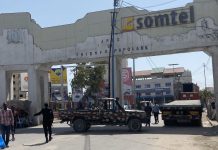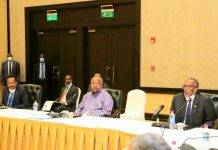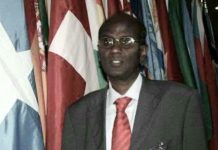Mogadishu (UM) – Prime Minister Hassan Ali Khaire appears to be obsessed with launching things. He is even more excited by being the face of reform while the very Minister’s tasked with leading these are standing next to him. He likes to see it as showing commitment, but this alone is not enough in a country struggling to recover from over 20 years of civil strife with destroyed public institutions, including, its civil service.
The launch of the Human Resource (HR) Audit by the Prime Minister (with the Minister of Labor and Social Affairs standing next to him) is important to establish the actual number and roles of government employee and correct the payroll data. The HR Audit has been a priority from the beginning as both the President and Prime Minister promised they will stamp out corruption within the public services. The focus of this audit is ghost workers who are draining limited public resources while delivering no service to the public. There will also be some focus on the conditions of those working according to the Prime Minister’s statement.
Civil service audits and reforms are necessary but controversial everywhere in the world. In Somalia, there is a chronic problem with ghost workers, poor service delivery, corruption, brain drain and poor management and leadership of staff in government organisations. This is why so much donor funds are targeted at building capacity.
The Prime Minister’s efforts to audit the Somali federal civil service is commendable but the challenges are clear and known to all. The civil service is unprofessional and dysfunctional because it is recruited tribally, poorly supervised by an unfit Commission and has too many older workers clinging to their salaries and blocking the entry of new, educated younger workers. Credit to the Prime Minister and his Finance Minister, this is the first time all civil service salaries have been paid in modern history. However, the question of who has been paid, for what and by whom, are very important too. These answers will shine a bright light on the challenges the civil service system must overcome to be fit for purpose in Somalia.
The Prime Minister’s reformist image, his main concern it appears at the moment, will improve once he starts to take his own human resource reforms seriously. He promised to appoint qualified Director Generals to all Ministries on merit last year, why has this process not been seen through? There are many qualified applicants awaiting a response from his office and the Ministerial committee he established to oversee this process. He must not disappoint them or there will be no public trust in any of the other reforms.
There are many “friends” of Somalia and donor funds running around Nairobi and the Mogadishu airport compound with whom both the Finance Minister and Prime Minister meet regularly. Would a sensible use of these monies, meant for Somalia, not be to establish a retirement fund for older workers who need to live in dignity after their service and create space for the younger generation on the civil service payroll?
There are many returning diaspora claiming to have experience and expertise in policy and public service delivery abroad and many of these people have been promoted to the highest echelons of Somali public service and life. Perhaps the Prime Minister should also test their capacity too and not just trust them because of their foreign passports. An audit, if it is to ever happen, must be comprehensive and conclusive.
We have all heard of your reforms, Mr. Prime Minister. Now let us see it.



























